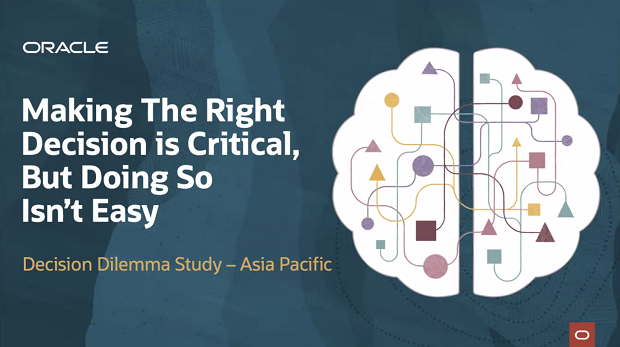A global study conducted in January 2023 by software maker Oracle and book author Seth Stephens-Davidowitz found that individuals and businesses are feeling overloaded by the tremendous amounts of data at their fingertips.

Worse, the strain from this data overload harms decision-making and from there, quality of life and business performance, according to the study.
In the media launch for the study on Thursday, April 27, Oracle Japan and Asia Pacific senior vice president of technology and customer strategy Chris Chelliah stated “There’s just tons of data. Data is really overwhelming people… [People are asking] what do we trust? What is the context? How does this fit in with that?”
The study, titled “The Decision Dilemma”, covered more than 14,000 employees and business leaders across 17 countries, including 4,500 respondents from the Asia Pacific region.
The study showed that 86 percent of respondents think the sheer volume of data is making decisions in their personal and professional lives more complicated.
Seventy five percent of those surveyed additionally expressed that they experienced data dilemma — the situation that occurs when a person doesn’t know what decision to make — at least once a day.
Anxiety spikes, missed opportunities, and unnecessary spending are only a few of the detrimental effects respondents undergo due to this inability to make decisions.
Similar data dilemmas have presented at the organizational level: 73 percent of business leaders concede that the volume of data and their lack of trust in data stopped them from making any decision at all in some situations, while 92 percent also maintain that the growing number of data sources has curbed the success of their organizations.
Moreover, while one of the promises of big data is to streamline organizations’ processes and cut down costs, business leaders’ inability to obtain useful insights from their data may have caused organizations to spend more rather than less.
The study also noted that managing different data sources require companies to spend for additional resources to gather all the data, slowing down strategic decision-making and introducing more opportunities for error.
But, despite the fact that employees and business leaders are frustrated with their inability to maximize the available information, many of the respondents acknowledge that data can be beneficial when properly managed, especially for businesses.
Forty five percent of the respondents indicate their decisions would be less accurate without data, 32 percent hold their decisions would be less successful, and 41 percent think their choices would have been more prone to error.
Seventy seven percent also believe that organizations using technology to make data-driven decisions are more trustworthy and will be more successful.
In short, even though most people and business leaders are learning that their big data analytics methods are not allowing them to make the most of their data, they recognize that data can still improve their decision-making process.
Organizations are simply realizing that on top of collecting data, they need to prioritize trusting, understanding, and making the best use of it.
Chelliah explained how companies can begin upgrading their data analytics: “When you have large volumes of data, [these] large silos need to be brought together so that there’s trust, integrated together so there’s context, and then provide actions that drive towards [a decision]. Last but not least, all that needs to be done in an automatic fashion.”
Companies such as Oracle are offering cloud, AI, and machine learning-based solutions to help businesses automate decision-making by increasing their trust in their data sources and putting their data in the right context so they can derive actionable recommendations from it.
“For businesses to go forward, for governments to go forward, for citizens, individuals, and employees to go forward, we want data to empower us. Not stress us out,” Chelia said.




